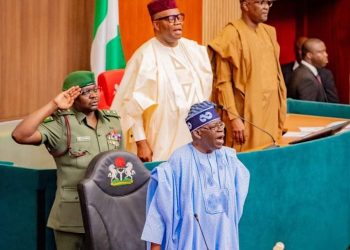The Nigerian Senate and the House of Representatives are preparing for emergency sessions on Thursday this week. The main agenda for these sessions is to extend the implementation period for the capital component of the 2023 budget, which is valued at N21.83 trillion, as well as for the N2.17 trillion supplementary budget for 2023.
The need for these emergency sessions arises from several previous extensions granted to the budgetary implementation periods. In December 2023, both chambers of the National Assembly extended the time frame for the implementation of the capital components of the 2023 budget, shifting the deadline from December 31, 2023, to March 31, 2024. At the same time, they also passed the N2.17 trillion supplementary budget.
Later, in March 2024, President Bola Tinubu made a formal request to the National Assembly to extend the implementation period even further. As a result, both the Senate and the House of Representatives agreed to extend the deadline once again, this time from March 31, 2024, to June 30, 2024. These adjustments were officially made during sessions held on March 19 and March 20, 2024.
With the current deadline of June 30, 2024, fast approaching, both chambers of the National Assembly have scheduled emergency sessions this week to consider extending the deadline even further. The sessions will take place before the lawmakers are set to resume their regular sittings on July 2, 2024.
Senator Yemi Adaramodu, the Chairman of the Senate Committee on Media and Public Affairs, confirmed the emergency sessions in a phone conversation with journalists on Wednesday. He explained that the main focus of the upcoming session would be on budgetary appropriations and ensuring legislative compliance. When asked specifically whether the extension of the capital component of the 2023 budget was expected, he mentioned that there would be discussions on a range of urgent legislative matters, but did not confirm any particular action on the extension.
“The Senate will address a broad array of issues during the Thursday plenary, particularly those related to budgetary appropriations and legislative compliance,” Senator Adaramodu stated. He also clarified that bills such as the 2024 Supplementary Appropriation and the New National Minimum Wage are not part of the agenda for the upcoming sessions, as they have not yet been forwarded to the National Assembly by President Bola Tinubu for consideration.
This decision to extend the budgetary implementation period reflects the ongoing adjustments made to Nigeria’s fiscal planning in response to various economic challenges. These changes are also a response to the need for more time to fully execute the capital component of the budget, which includes vital infrastructure projects and investments that are often delayed due to various reasons such as bureaucratic hurdles, budgetary constraints, or unforeseen circumstances.
The capital component of the 2023 budget is particularly important because it represents the portion of the budget that is allocated for long-term investments, such as infrastructure development, which is crucial for the country’s economic growth. Extending the period for its implementation allows for these projects to continue and ensures that the funds allocated for them are fully utilized.
The supplementary budget, passed in November 2023, was introduced to address unforeseen expenditures and to provide additional funds for various government needs. The N2.17 trillion allocated in the supplementary budget is expected to support critical areas, including security, healthcare, and other urgent sectors that require additional funding beyond what was initially planned in the main budget.
As the deadline for the implementation of the 2023 budget approaches, lawmakers are keen to ensure that these funds are properly allocated and spent. The emergency sessions on Thursday will likely be a crucial step in ensuring that any remaining budgetary issues are addressed, and that the government has the necessary financial resources to carry out its planned projects and programs.
In summary, the National Assembly is taking important steps to manage the 2023 budget and its implementation. The emergency sessions scheduled for Thursday are an essential part of ensuring that the capital component of the budget, as well as the supplementary budget, continue to be effectively implemented. The upcoming sessions will provide lawmakers with the opportunity to make necessary adjustments to the implementation timelines and ensure that Nigeria’s fiscal policies remain on track for the rest of the year.

